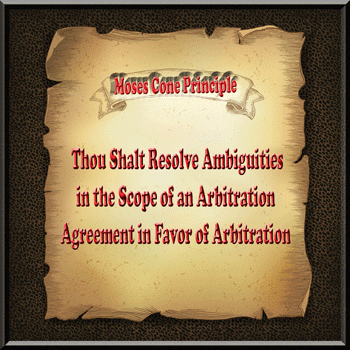Introduction

Back in 1983 the U.S. Supreme Court, in the landmark decision Moses H. Cone Memorial Hosp. v. Mercury Constr. Corp., 460 U.S. 1, 24-25 (1983) (Brennan, J.), famously declared that “[t]he [Federal] Arbitration Act establishes that, as a matter of federal law, any doubts concerning the scope of arbitrable issues should be resolved in favor of arbitration, whether the problem at hand is the construction of the contract language itself or an allegation of waiver, delay, or a like defense to arbitrability.” Moses Cone thus established that there was a presumption in favor of arbitrability in cases governed by the Federal Arbitration Act, a conclusion that a number of other lower courts had previously reached, and which the Court had adopted about 23 years previously as a matter of federal labor law derived from Section 301 of the Labor Management Relations Act (sometimes referred to as the “Taft-Hartley Act”). See United Steel Workers of Am. v. Warrier & Gulf Nav. Co., 363 U.S. 574, 582-83 (1960) (Douglas, J.) (“An order to arbitrate the particular grievance should not be denied unless it may be said with positive assurance that the arbitration clause is not susceptible of an interpretation that covers the asserted dispute. Doubts should be resolved in favor of coverage.”)
The presumption of arbitrability is not a talismanic solution to every arbitration-law related problem. In fact it is designed to address only questions about the scope of an arbitration agreement.
The presumption has two related components. First, when courts construe the scope provision of an arbitration agreement to determine what merits-related issues the parties agreed to arbitrate, the court resolves ambiguities in favor of arbitration. See, e.g., Mastrobuono v. Shearson Lehman Hutton, Inc., 514 U.S. 52, 62 (1995). Second, it presumes that procedural issues arising out of arbitrable disputes, and contract-related defenses to arbitrability—that is, “allegation[s] of waiver, delay and like defenses to arbitrability[,]” are presumptively for the arbitrator. See Moses Cone, 460 U.S. at 24-25; Howsam v. Dean Witter Reynolds, Inc., 537 U.S. 79, 84 (2002).
Roughly ten days ago, in a post about U.S. Circuit Judge Richard A. Posner’s Sprint Spectrum decision, we wrote about how some judges have interpreted the presumption too expansively:
The federal policy in favor of arbitration has, at least arguably, been interpreted to apply more expansively than the U.S. Supreme Court likely intended. As a result, even though the U.S. Supreme Court has said many times that arbitration is supposed to be a “matter of contract,” or one of “consent not coercion,” an overly expansive interpretation of the policy has, at least in some cases, arguably resulted in arbitration agreements being placed on a considerably more advantaged footing than ordinary contracts. As we read it, Judge Posner’s comment in Roughneck raises the question whether this might have more to do with “limit[ing] judicial workloads” than a desire to enforce contracts as written and according to their terms.
(Read our Sprint Spectrum post here.)
With all the hoopla about the presumption of arbitrability, one would think it very difficult to find a case that didn’t apply the presumption of arbitrability in a situation where it was supposed to apply it. In general that’s probably true, but on June 2, 2015 the U.S. District Court for the Western District of Washington proved that truth is not a universal one.
In Scolari v. Elliot Rust Co., No. C15-5163 (BHS), slip op. (W.D. Wash. June 2, 2015) the court considered whether ambiguity created by apparently conflicting forum selections clauses: one arbitral and two judicial. While the Court’s reasoning indicated that it considered the issue before it one of contract interpretation—the resolution of ambiguity—it nevertheless held that the ambiguity had to be resolved against the drafter of the contract, which the district court thought Washington law required, rather than in favor of arbitration, which was what federal law required. While it apparently recognized that application of the presumption, rather than a state-law contra proferentem rule, would have required the court to stay the litigation, it nevertheless denied the requested stay of litigation, concluding that the issue before it concerned the enforceability of the arbitration agreement, rather than an interpretation of its scope.
The net effect of the ruling was for the district court to implicitly have found that a judicial forum selection clause trumped an arbitral one, simply because they overlapped in scope, and that accordingly the arbitral forum selection clause was not enforceable. There was no legal basis for such a finding and the district court cited none.
The seriousness of the error was compounded by the district court’s acknowledgement that the arbitration proponent had advanced a reasonable interpretation of the arbitration agreement and judicial forum selection clauses, which harmonized them, and would have allowed arbitration to proceed, with the district court staying its hand in the interim. Instead of adopting that interpretation, it said that the arbitration challenger’s interpretation was likewise “reasonable,” but the court did not say what the challenger’s interpretation was, and given the disposition of the case, we assume that the “interpretation” was that the parties must not have intended to include a concededly existing and valid arbitration agreement in their agreement. But that interpretation not only ignored the presumption of arbitrability, but the general rule of contract interpretation that one contract provision not be construed to negate another.
We do not know whether the arbitration proponent preserved the argument for appeal, but there was another ground for a stay of litigation in this case that would have bypassed the issue of the presumption of arbitrability. The arbitration agreement contained a delegation clause, which clearly and unmistakably required the parties to submit to arbitration all disputes about arbitrability. Because there was no dispute about the existence or validity of the delegation clause, the Court should have held that the resolution of the apparent conflict between arbitral and judicial forum selection clauses was a question for the arbitrators.
If the arbitration proponent decides to appeal the decision, we hope that the U.S. Court of Appeals for the Ninth Circuit will correct these errors without delay, so that the parties can arbitrate their disputes, which is, after all, what they agreed to do.
Background
 Scolari v. Elliot Rust Co., No. C15-5163 (BHS), slip op. (W.D. Wash. June 2, 2015), arose out of the purchase, sale, termination and buyback of an interest in a limited liability company. Effective January 1, 2013 the plaintiff (the “Buyer”) purchased a ten-percent ownership interest in Elliot Rust Companies, LLC (the “LLC”), the purchase and sale of which was governed by a “Grant Agreement” executed by the parties “according to the terms of [an] Amended and Restated LLC Agreement of Elliot Rust Companies, LLC dated January 1, 2013.” Both agreements were apparently part of the same transaction and were entered into at or about the same time.
Scolari v. Elliot Rust Co., No. C15-5163 (BHS), slip op. (W.D. Wash. June 2, 2015), arose out of the purchase, sale, termination and buyback of an interest in a limited liability company. Effective January 1, 2013 the plaintiff (the “Buyer”) purchased a ten-percent ownership interest in Elliot Rust Companies, LLC (the “LLC”), the purchase and sale of which was governed by a “Grant Agreement” executed by the parties “according to the terms of [an] Amended and Restated LLC Agreement of Elliot Rust Companies, LLC dated January 1, 2013.” Both agreements were apparently part of the same transaction and were entered into at or about the same time.
The Buyer and LLC were the only parties to the Grant Agreement, which provided that the Buyer would acquire its 10% interest “according to the terms of the terms of the Amended and Restated LLC Agreement of Elliot Rust Companies, LLC dated January 1, 2013
The Grant Agreement provided, among other things, that:
[Scolari] understands, acknowledges and agrees that, upon execution of this Grant Agreement and the joinder to the LLC Agreement, [Scolari] shall, without further action or deed, thereupon be bound by the LLC Agreement, as it may thereafter be restated or amended, as though a direct signatory thereto.
It contained a “jurisdiction” clause that stipulated Washington law as governing and the U.S. District Court for the Western District of Washington as the exclusive judicial forum:
Governing Law: Jurisdiction. This Grant Agreement and the transaction contemplated hereby shall be governed by and construed according to the laws of the state of Washington. With respect to any dispute arising out of or related to this Grant Agreement or the LLC Agreement, the parties hereby consent to the exclusive jurisdiction of the United States District Court for the Western District of Washington. . . .
 The LLC Agreement, unlike the Grant Agreement, contained a broad arbitration agreement, which said:
The LLC Agreement, unlike the Grant Agreement, contained a broad arbitration agreement, which said:
Arbitration. All disputes, claims or controversies relating to this Agreement that are not resolved by mediation shall be submitted to final and binding arbitration. . . . Questions or arbitrability or the scope of the parties’ agreement to arbitrate shall be determined by the arbitrator.
But like the Grant Agreement, the LLC Agreement also contained a jurisdiction and venue clause:
Jurisdiction and Venue. Any suit involving any dispute or matter arising under this Agreement may only be brought in the United States District Court for the Western District of Washington or the Superior Court of Pierce County. All Members hereby consent to the exercise of personal jurisdiction by any such court with respect to any such proceeding.
The LLC terminated the plaintiff on November 6, 2014, and on December 15, 2014 offered to buy plaintiff’s 10% interest out for $158,882.60. The plaintiff refused the offer one week later, claiming that he did not believe it to be accurately valued.
 Unable to agree a resolution the plaintiff filed suit in March 2015, requesting a judgment declaring he has a 20% interest in the profits of the LLC, and equitable relief.
Unable to agree a resolution the plaintiff filed suit in March 2015, requesting a judgment declaring he has a 20% interest in the profits of the LLC, and equitable relief.
The LLC moved on April 3, 2015 to dismiss for improper venue or to stay the action pending arbitration under Section 3 of the Federal Arbitration Act pending arbitration. The Court denied the motion.
The District Court’s Analysis and Conclusions
The Court began its analysis by acknowledging that its “role” was confined “‘to determining (1) whether a valid agreement to arbitrate exists and, if it does, (2) whether the agreement encompasses the dispute at issue.’” Slip op. at 4 (quoting Chiron Corp. v. Ortho Diagnostic Sys., Inc., 207 F.3d 1126, 1130 (9th Cir. 2000)). If the arbitration proponent establishes that the answers to both questions are “yes,” then, said the Court, the Court must “‘enforce the arbitration in accordance with its terms.’” Slip op. at 4 (quoting 207 F.3d at 1130). And in discussing the standard applicable to question (2), the Court, playing homage to the strong presumption in favor of arbitration, said “‘any doubts concerning the scope of arbitrable issues should be resolved in favor of arbitration. . . .’” Slip op. at 4 (quoting 207 F.3d at 1131).
So far, so good. But having accurately stated the governing rules, the Court inexplicably failed to heed them. Continue Reading »









